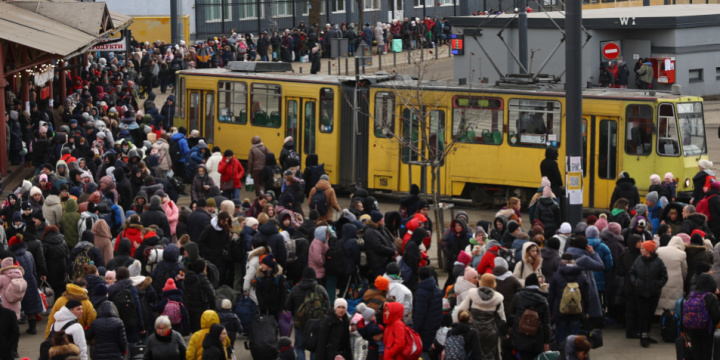The Atrocities in Ukraine — Then and Now
 by Steven Tenenbaum
by Steven Tenenbaum

Refugees fleeing the ongoing Russian invasion of Ukraine wait for hours to board a train to Poland, outside the train station in Lviv, Ukraine, March 8, 2022. REUTERS/Kai Pfaffenbach
Beis oylum.
Of the many Yiddish terms or phrases used to describe a cemetery (most, if not all, come directly from the Hebrew), this is the one that I remember most. Its origin is from Ecclesiastes 12.5 – beit olehmo (everlasting or eternal home).
It is what my father called Riverside Cemetery in New Jersey, where his mother and brother were buried, and where he now rests next to my mother.
I never could come to terms with the murder of my mother’s father, Isaac Frucht, on or about May 27, 1943.
The Jewish ghetto in Busk, just east of Lviv, was liquidated only days earlier. Isaac was hiding with his wife Fayga, and their youngest daughter, Ester. Two older daughters, my mother Salka and their eldest Clara, had only recently escaped, using false papers purchased at great cost.
My grandparents and their daughter shared a cramped storage shed on a farm owned by a Polish family. After only a few days, my grandfather grew impatient, and thought that he might be able to join a group of partisans in the nearby forest.
He said his goodbyes, never to be seen by his loved ones again.
Isaac was able to meet several others in the forest, but they were soon discovered by a young Ukrainian boy, who quickly told his father. The Jews were stalked and all but one was murdered.
Leaving the corpses in the woods, the hunters returned to Busk to celebrate their success, proudly displaying my grandfather’s watch. The sole Jewish survivor escaped, and was able to confirm the circumstances of the murders.
When there is no certainty or specific location of burial, and no memorial, everywhere can be that place.
When there is no sanctity for the dead, there can be no peace for the living. When the images appear in the media of the dead numbering in hundreds or thousands, on the streets of Ukrainian towns and cities, in mass graves, or partially buried in muddy ravines, I shudder anew at what had befallen my grandfather and so many others.
I mourn the senseless killing in a land only too accustomed to such brutality. I look around me, and see streets and forests that can be so horribly transfigured if evil is not met by reason and resolve. Beis oylum — our eternal home.
The son of Holocaust survivors from Ukraine and Poland, Steven Tenenbaum is a retired surgeon who records his encounters with memory and legacy on his website: memorycarriers.com
 US Issues Further Sanctions on Iran, Targets Drones
US Issues Further Sanctions on Iran, Targets Drones UN Rapporteur With History of Anti-Israel Animus Supports Pro-Hamas Protests on College Campuses
UN Rapporteur With History of Anti-Israel Animus Supports Pro-Hamas Protests on College Campuses We Need to Invest in Academic Research on Antisemitism Now
We Need to Invest in Academic Research on Antisemitism Now US Academic Skews Stats to Compare Gaza to Actual Case of Genocide
US Academic Skews Stats to Compare Gaza to Actual Case of Genocide WIll Israel-Iran Conflict Spiral Out of Control — or Will Both Sides Play It Safe?
WIll Israel-Iran Conflict Spiral Out of Control — or Will Both Sides Play It Safe? It’s All About ‘Time’: Israel Cannot Survive If It Does Not Address Iranian Nuclear Weapons
It’s All About ‘Time’: Israel Cannot Survive If It Does Not Address Iranian Nuclear Weapons US, 17 Other Countries Urge Hamas to Release Hostages, End Gaza Crisis
US, 17 Other Countries Urge Hamas to Release Hostages, End Gaza Crisis Iranian, 2 Others Detained in Peru Over Plot to Kill Israelis
Iranian, 2 Others Detained in Peru Over Plot to Kill Israelis Iran Sentences Rapper Toomaj Salehi to Death Over 2022-23 Unrest
Iran Sentences Rapper Toomaj Salehi to Death Over 2022-23 Unrest Netanyahu: ‘Antisemitic Mobs Have Taken Over Leading U.S. Universities’
Netanyahu: ‘Antisemitic Mobs Have Taken Over Leading U.S. Universities’



 WIll Israel-Iran Conflict Spiral Out of Control — or Will Both Sides Play It Safe?
WIll Israel-Iran Conflict Spiral Out of Control — or Will Both Sides Play It Safe? US Academic Skews Stats to Compare Gaza to Actual Case of Genocide
US Academic Skews Stats to Compare Gaza to Actual Case of Genocide We Need to Invest in Academic Research on Antisemitism Now
We Need to Invest in Academic Research on Antisemitism Now UN Rapporteur With History of Anti-Israel Animus Supports Pro-Hamas Protests on College Campuses
UN Rapporteur With History of Anti-Israel Animus Supports Pro-Hamas Protests on College Campuses US Issues Further Sanctions on Iran, Targets Drones
US Issues Further Sanctions on Iran, Targets Drones